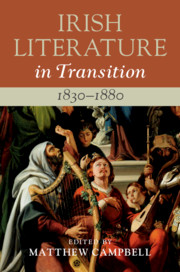Book contents
- Irish Literature in Transition, 1830–1880
- Irish Literature in Transition
- Irish Literature in Transition, 1830–1880
- Copyright page
- Contents
- Contributors
- Series Preface
- General Acknowledgements
- Acknowledgements
- Part I Contexts and Contents: Politics and Periodicals
- Part II Ireland and the Liberal Arts and Sciences
- Part III From the Four Nations to the Globalising Irish
- Chapter 8 England and Ireland, Tory and Whig: Thackeray, Trollope, Arnold
- Chapter 9 Imperial Minds: Irish Writers and Empire in the Nineteenth Century – Charles Gavan Duffy, Thomas Moore, Charles Lever and Kim
- Chapter 10 An Exiled History: Young Ireland from Mitchel to O’Leary
- Chapter 11 US Nation Building and the Irish-American Novel, 1830–1880
- Part IV The Languages of Literature
- Index
Chapter 10 - An Exiled History: Young Ireland from Mitchel to O’Leary
from Part III - From the Four Nations to the Globalising Irish
Published online by Cambridge University Press: 29 February 2020
- Irish Literature in Transition, 1830–1880
- Irish Literature in Transition
- Irish Literature in Transition, 1830–1880
- Copyright page
- Contents
- Contributors
- Series Preface
- General Acknowledgements
- Acknowledgements
- Part I Contexts and Contents: Politics and Periodicals
- Part II Ireland and the Liberal Arts and Sciences
- Part III From the Four Nations to the Globalising Irish
- Chapter 8 England and Ireland, Tory and Whig: Thackeray, Trollope, Arnold
- Chapter 9 Imperial Minds: Irish Writers and Empire in the Nineteenth Century – Charles Gavan Duffy, Thomas Moore, Charles Lever and Kim
- Chapter 10 An Exiled History: Young Ireland from Mitchel to O’Leary
- Chapter 11 US Nation Building and the Irish-American Novel, 1830–1880
- Part IV The Languages of Literature
- Index
Summary
The failure of the 1848 revolt scattered Young Ireland leaders across the globe. Whether transported or in exile, they carried on their campaign in the only way they could – through their writings. Taking their lead from the Nation, many founded newspapers and wrote history, memoir and ballad. Foremost among them were Michael Doheny, Thomas D’Arcy McGee and John Mitchel. Mitchel’s Jail Journal and The Last Conquest of Ireland (Perhaps) were strongly influenced by being composed in prison and in exile. The former became a seminal text for generations of Irish nationalists, who saw it as an eloquent and fervent denunciation of the cruelty and hypocrisy of the British Empire. Exile also provided the perspective to write on the Great Famine of 1845–1848, a catastrophe so great that it rendered most nationalist writers mute with shame and bewilderment. Mitchel. though, chose to deal with it not as an isolated and unprecedented disaster, but, in historical context, as the latest and most ruthless of England’s attempts to crush Irish resistance once and for all. His interpretation of the Famine as a deliberate act of genocide became the accepted view of many nationalists, in Ireland and abroad. The same period was covered in less vitriolic style by Mitchel’s erstwhile colleague Charles Gavan Duffy who put his main emphasis on the political failings and flaws of Daniel O’Connell and the idealistic self-sacrificing patriotism of the Young Irelanders. The apparent moderation of Duffy’s writings and the caution and compromises of his later political career led many younger nationalists to identify with the more rebellious Mitchel. Chief among these was John O’Leary, whose noble character and unflinching idealism made him one of the most influential of the Fenians. It was O’Leary who introduced the young W. B. Yeats to the writings of Young Ireland, and though the mature Yeats later dismissed much of their work as shallow and chauvinistic, he continued to acknowledge its enduring capacity to move and inspire.
Keywords
- Type
- Chapter
- Information
- Irish Literature in Transition, 1830–1880 , pp. 162 - 178Publisher: Cambridge University PressPrint publication year: 2020

